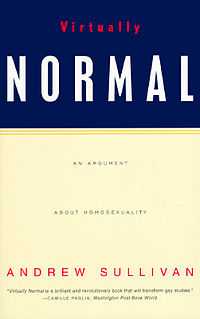Virtually Normal
 | |
| Author | Andrew Sullivan |
|---|---|
| Country | United States |
| Language | English |
| Subject | Politics |
| Genre | Non-fiction |
| Published | 1995 (Picador) |
| Pages | 225 |
| ISBN | 0-330-34696-2 |
Virtually Normal: An Argument About Homosexuality is a 1995 book about the politics of homosexuality by Andrew Sullivan.
Summary
The book presents the reader with four groups of citizens who view homosexuality in a specific manner within American society, criticizing the arguments: Prohibitionists, Liberationists, Conservatives, and Liberals.
The Prohibitionists comprise strict followers of the Bible. They believe that "homosexuality is an aberration and that homosexual acts are an abomination"[1] and that homosexuality is an illness that requires a cure and that homosexual acts should be punished. Sullivan asserts that there is inconsistency with Prohibitionists that use Biblical and moral arguments against homosexuality yet not against other conditions many Christians find sexually immoral. In order for Prohibitionists to have effective policy, they have to be hypocritical in their denial of marriage to gays yet not to infertile couples (because they claim marriage's sole purpose is procreation). However, if the Prohibitionists are consistent, then their views are too marginal to be accepted by society at large.
The Liberationists are epitomised by Queer Nation. They believe, like the Prohibitionists, that no one is "homosexual" but for a different reason. To a Liberationist, words such as "homosexual", "homosexuality", "gay", and "lesbian" are simply tools that the straight majority use to oppress the gay minority. An example of this would be that a gay man who feels sexual attraction for a particular woman would be limited by the chains of his "sexual orientation". Sullivan claims their flaw to be that liberationist policy, by rejecting the notion of limiting oneself to words, fails to improve the plight of the gay community.
Conservatives, unlike the Prohibitionists, don't believe that everyone is essentially heterosexual. They acknowledge the existence of a gay minority. However, they believe that homosexuality should be only a private matter and kept silent in public matters. They further believe that gays should not seek to change public acceptance of homosexuality because social change will come with time, just as it has for other minorities. Sullivan says that the problem of the Conservatives is that as gays gain increasing acceptance in Western societies, they are faced with two alternatives. The first is a path of "increasing isolation and uncomfortable hostility to homosexuality".[1] The second is to incorporate homosexual trends into their conservatism, as those originally opposed to women's suffrage eventually accepted the notion of women contributing to the conservative tradition of democracy.
The Liberals seek to apply liberalism as has been applied to other minorities to the gay community. Sullivan argues that the liberals want to apply a cookie-cutter agenda of "liberalism" that would render many gays as permanent victims of civil rights abuse. He says that the liberals are guilty of "trying to use easy remedies for a problem that knows no easy remedies; using the language of rights in an area where it is impossible to avoid the language of goods; encouraging an attitude among homosexuals that might actually increase their isolation rather than undermine it".[1] They are said to limit the freedom of the majority to give rights to minorities. Sullivan also adds that anti-discrimination laws are reifying.
Finally, Sullivan concludes on gay marriage, arguing that it would be a good thing as it would be both a humanising and traditionalising effort. He also advocated the repeal of Don't ask, don't tell, which was still in effect when he wrote the book.
Scholarly reception
Although praised by The New York Times,[2] the book was dismissed by Richard D. Mohr in The Journal of Homosexuality.[3]
Simon LeVay criticized Sullivan's attempt to show that Saint Paul did not condemn homosexuality as such.[4] Philosopher Edward Stein, in his The Mismeasure of Desire (1999), criticized Virtually Normal for its treatment of social constructionism, arguing that Sullivan does not succeed in showing that constructionism is false.[5]
Michael Warner's The Trouble With Normal (1999) has been characterized as a direct response to Virtually Normal.[6]
References
- ↑ 1.0 1.1 1.2 Sullivan, Andrew (1996). Virtually Normal: An Argument About Homosexuality. London: Picador. pp. 20, 132, 167, 168. ISBN 0-330-34696-2.
- ↑ http://www.nytimes.com/books/97/07/06/reviews/18419.html?_r=1&scp=2&sq=%22virtually%20normal%22%20&st=cse&oref=slogin
- ↑ 'Book Reviews', Richard D. Mohr, The Journal of Homosexuality Volume 34, Issue 2, pp. 95-101
- ↑ LeVay, Simon (1996). Queer Science: The Use and Abuse of Research into Homosexuality. Cambridge, Massachusetts: MIT Press. pp. 297–298. ISBN 0-262-12199-9.
- ↑ Stein, Edward (1999). The Mismeasure of Desire: The Science, Theory, and Ethics of Sexual Orientation. Berkeley: Oxford University Press. p. 111. ISBN 0-19-514244-6.
- ↑ Van Buskirk, James E. (1999). "The Trouble With Normal (review)". The Library Journal.